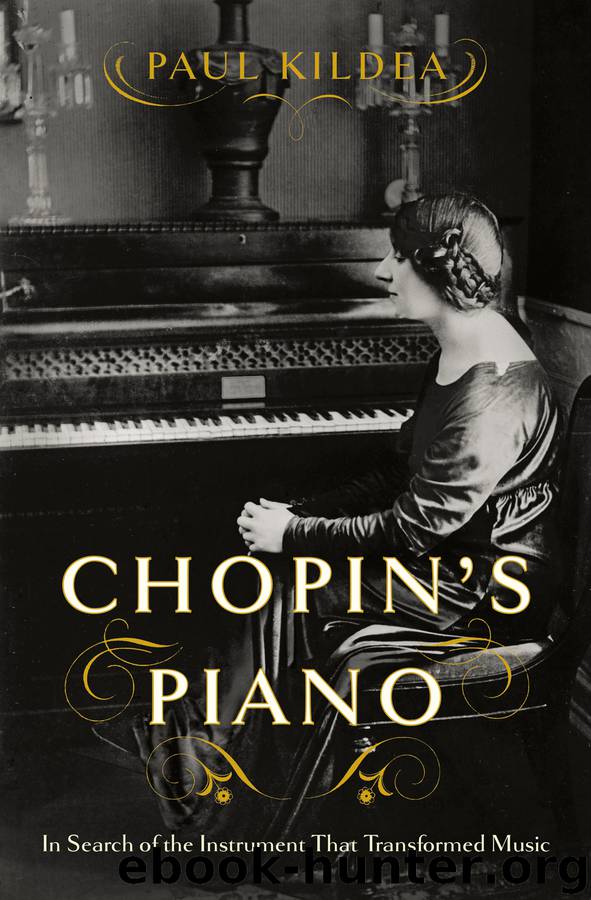Chopin's Piano by Paul Kildea

Author:Paul Kildea
Language: eng
Format: epub
Publisher: W. W. Norton & Company
Published: 2018-07-16T16:00:00+00:00
They were in an impossibly vexing position: the hated Russian Empire was at war with Landowska’s adopted country, which had made them civil prisoners. “The Germans want to liberate us [Poles] from the Russian yoke,” she wrote in December 1914, the war just four months old. “The Russians are unwilling to permit our falling under the German boot; while Austria wants to give us an Archduke. They growl over us, tearing us apart; we are dismembered, worse, yes, worse than ever before, and the Kingdom itself is no more.”
She captured this confusion so well, squirrelling away on each page the tiny scraps of newspaper clippings she foraged as the weeks and months passed. She writes of more humane weaponry in France; aerial bombardment; explosive devices modelled on the armoury of anarchists; the terrible consequence of gas warfare, then unknown to the German populace. She analyses the make-up of the Russian army, how the Polish, Armenian, Georgian, Finnish and Jewish recruits have no interest in Russia’s victory, how they recognized the insanity of laying down their lives without knowing why. She writes how the Busonis were leaving for the States with no enthusiasm for capitalist America, just a desire to escape the depressing atmosphere of Berlin and a war Busoni detested. She relates sceptically information she is told by a man she meets, quite by chance, that German soldiers were surviving on a diet of bread and hay, unsure as she is whether this would be a good thing or a bad thing.
Yet for all the political uncertainties and confusion, Landowska remained clear-sighted about cultural matters. She attended conductor Siegfried Ochs’s performance of Emil von Reznicek’s Symphony “Friede” (Peace). “It sounded poor, empty, fatally noisy and loud. Some music. Everyone about us was horrified by it. If this is ‘Friede’ then we might as well have war.” She thought Ochs’s conducting of Bach’s Mass in B Minor clumsy, the choirs too loud, the orchestra heavy and churlish. “It is like attending a showing of calves: noise and from time to time a sound that sounds reasonable, and, again a murmur here and there.” Trying on hats and looking at dresses made by a German acquaintance, she was horrified at the determination to hold on to pre-war notions of elegance and taste. “After the war, conditions will be altered and, once again, models will be imported from Paris, just as it should be, as, for example, tea from China.” There was in any case something sour in their charade. “At present only two models seem fitting for a woman in our day: the funereal for those who have lost a loved one; and a very simple type of costume for those who still await their tragic moment to come.” In such ways Landowska and Lew, in the comfort of the apartment Binder had photographed so well, survived the war.
Download
This site does not store any files on its server. We only index and link to content provided by other sites. Please contact the content providers to delete copyright contents if any and email us, we'll remove relevant links or contents immediately.
The Goal (Off-Campus #4) by Elle Kennedy(12421)
Kathy Andrews Collection by Kathy Andrews(10505)
Diary of a Player by Brad Paisley(6862)
What Does This Button Do? by Bruce Dickinson(5519)
Assassin’s Fate by Robin Hobb(5228)
Big Little Lies by Liane Moriarty(4876)
Pale Blue Dot by Carl Sagan(3995)
Sticky Fingers by Joe Hagan(3449)
The Heroin Diaries by Nikki Sixx(2928)
The Death of the Heart by Elizabeth Bowen(2895)
Beneath These Shadows by Meghan March(2709)
The Help by Kathryn Stockett(2700)
Confessions of a Video Vixen by Karrine Steffans(2668)
How Music Works by David Byrne(2519)
Jam by Jam (epub)(2480)
Harry Potter 4 - Harry Potter and The Goblet of Fire by J.K.Rowling(2413)
Strange Fascination: David Bowie: The Definitive Story by David Buckley(2364)
Petty: The Biography by Warren Zanes(2234)
Darker Than the Deepest Sea by Trevor Dann(2204)
